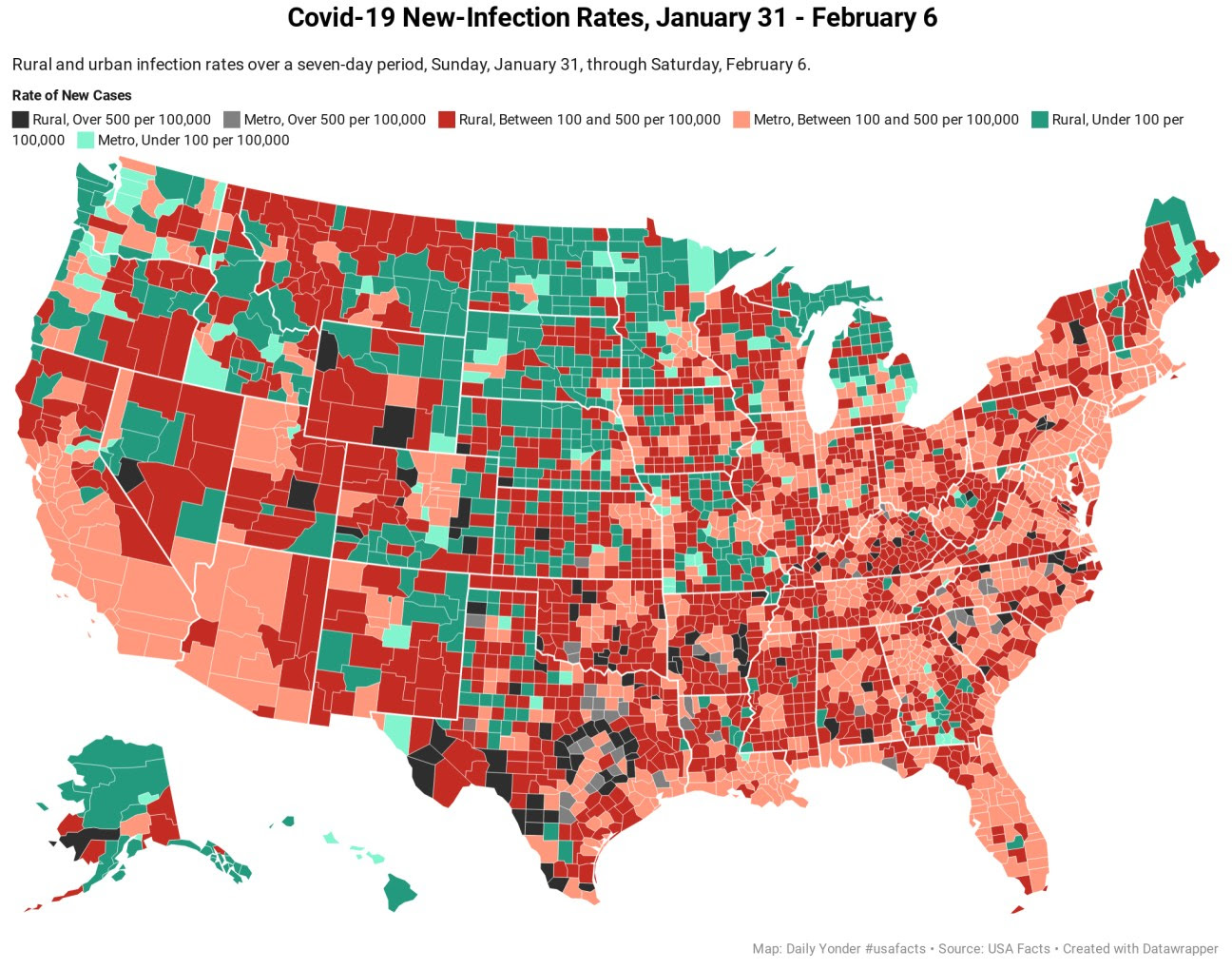- Colorectal Cancer Is Rising among Younger Adults. Some States Want to Boost Awareness.
- Rural Hospitals Built During Baby Boom Now Face Baby Bust
- Food Stamps Go Further in Rural Areas — Until You Add Transportation Costs
- CMS Announces Resources and Flexibilities to Assist with the Public Health Emergency in the State of Texas
- CMS Proposes New Payments for Digital Health Under CY2025 PFS Draft Rule
- Improving Public Health by Strengthening Community Infrastructure
- Biden Harris Administration Proposes Policies to Reduce Maternal Mortality, Advance Health Equity, and Support Underserved Communities
- Nearly Half of U.S. Counties Don't Have a Single Cardiologist
- Randolph County, Ill. Turns Unused Part of Nursing Home Into State-Of-The-Art Behavioral Health Center
- Safe and Stable Housing Is a Foundation of Successful Recovery
- Rural RPM Program Is a Lifeline for Pregnant Women
- Expert: Rural Hospitals Are Particularly Vulnerable to Increasing Cyberattacks Targeting Healthcare Facilities
- Biden-Harris Administration Invests Over $200 Million to Help Primary Care Doctors, Nurses, and Other Health Care Providers Improve Care for Older Adults
- AJPH Call for Papers Special Section on Intersections of Public Health And Primary Care
- NIH HEAL Initiative Turns Attention to Pragmatic Trials in Rural Communities
Commentary: Five Signs Rural Elders May Need A Helping Hand

By Donna Kallner
Families who have followed recommended guidelines on social distancing for nearly a year are looking forward to the time when pandemic precautions lift and they can hug their elders again. But there may be some surprises in store once you get past the front door.
Read more
New Infections Ease in Rural Counties, but the Number of Deaths Climbs Slightly

By Tim Murphy and Tim Marema
New cases dropped by 8% last week in rural counties, but the number of new Covid-related deaths climbed by about 1%.
Read more

Without a Ride, Many in Need Have No Shot at Covid-19 Vaccine

By Jenni Bergal, Stateline
Experts identified cold storage capacity, facilities and personnel, and – above all – transportation as the main roadblocks to vaccinating parts of rural populations.
Read more
Employers Respond to Changing Needs of Workforce in Pandemic
The COVID-19 pandemic has made for a continually changing workforce environment. Companies are adapting their practices and policies to support their staff by offering flexible paid and unpaid leave policies, reimbursing remote-work expenses and giving access to tools for managing stress and improving mental health. Employers are also providing on-going support for employees to help them understand and maximize their benefit package. Click here for more information and recent survey results from the International Foundation of Employee Benefit Plans (IFEBP).
Study Finds Young Adults Are Major Coronavirus Spreaders
A new study finds that adults aged 20-49 were responsible for most virus transmission last year, even after schools reopened in the fall. The study, published in Science, challenges the notion that non-vulnerable people can go about their normal lives, while vulnerable people self-isolate. Three-quarters of new infections originated from adults 20–49 until mid-August of last year, with adults 35–49 contributing the most to spread. In October, after a large portion of U.S. students returned to school, this age group was still responsible for about 72 percent of new infections. The study estimates that school reopening’s increased total infections by about 26 percent as of October, and deaths by about six percent–because children and teenagers spread the virus to adults, who are “more transmission efficient.”
Long-Term Impacts of COVID-19 Leaves Questions
Millions of COVID-19 survivors worldwide–even those who had mild illness–are reporting long-term symptoms months later, including brain fog, persistent exhaustion and lung, heart or kidney damage. For too long, these long haulers, as they call themselves, have not been taken seriously enough by providers and researchers according to some doctors, adding that there’s an urgent need for dedicated research in order to treat patients with lingering symptoms. Many providers and healthcare systems initially dismissed the symptoms as related to something else, but growing evidence points to SARS-CoV-2 as the culprit in many cases. More research is needed to determine the full long-term effects.
Biden Task Force Promises Aid to Hardest-Hit
Marcella Nunez-Smith, chair of President Biden’s COVID-19 Equity Task Force, told press and advocates during a January 28 White House health briefing that outreach to communities of color, people with disabilities and other marginalized groups will be a priority for the administration’s COVID-19 response. Black, Latino and Native Americans have disproportionately suffered higher rates of infection, hospitalization and death since the beginning of the pandemic, with the national death rate of Black patients reaching twice that of White patients last summer. Some distribution data suggest vaccine uptake is currently almost twice as high among White people on average than Black and Latino people despite the disproportionate morbidity and mortality rates.
New Report on the Financial Impact of COVID-19 on FQHCs
Capital Link has issued a new report providing a national picture of health center revenue loss, COVID-19-related expenses, the influx of relief funds through Dec. 31, 2020 and the estimated funding gap, based on the 15-month period from April 2020 through June 2021. Results show that the nation’s more than 1,400 Federally Qualified Health Centers (FQHCs) experienced a 26 percent decline in patient visits between April and December 2020, as patients complied with stay-at-home orders. Without additional support to cover the identified $5.5B shortfall through June 2021, many health centers sites will remain closed, and 29,000 staff may be laid off or furloughed and 66 percent of FQHCs will drain cash reserves to dangerous levels.
HHS Amendment PREP Act Declaration Increases Who Can Administer COVID-19 Vaccines
The U.S. Department of Health and Human Services (HHS) issued a fifth amendment to the PREP Act Declaration (not to be confused with PrEP for HIV) under the Public Readiness and Emergency Preparedness Act (PREP Act) to add additional categories of qualified persons authorized to prescribe, dispense, and administer COVID-19 vaccines. And in Pennsylvania, there is a document from October 2020 that actually delineates who can administer COVID-19 vaccines, including dental providers. However, there are protocols that need to be followed in order to do so.
Federal Retail Pharmacy Vaccination Program Set to Launch
President Biden announced his comprehensive National Strategy to combat the COVID-19 pandemic. The President announced that starting next week, the first phase of the federal pharmacy program will launch and select pharmacies nationwide will start offering vaccinations for their communities. These new steps will help meet the President’s goal of administering 100 million shots in 100 days and expand access to vaccines to more Americans in the coming weeks.
- Expanding Vaccine Supply: The Biden Administration will increase overall weekly vaccine supply to states, Tribes, and territories to 10.5 million doses nationwide beginning this week, a 22% increase since taking office on January 20.
- Launching First Phase of the Federal Retail Pharmacy Program for COVID-19 Vaccination: Starting on February 11, those eligible for the vaccine will have the opportunity to be vaccinated at select pharmacies across the country through this program, a public-private partnership with 21 national pharmacy partners and networks of independent pharmacies representing more than 40,000 pharmacy locations nationwide. As the first phase of this program launches, select retail pharmacies nationwide will receive limited vaccine supply to vaccinate priority groups at no cost. The Centers for Disease Control and Prevention (CDC) worked with states to select initial pharmacy partners based on several factors including their ability to reach some of the populations most at risk for severe illness from COVID-19. More information is available at cdc.gov/covid19.
- Increasing Reimbursements to States: President Biden already directed the Federal Emergency Management Agency (FEMA) to fully reimburse states for the cost of National Guard Personnel and emergency costs, will also retroactively reimburse states fully for FEMA-eligible services and is requesting $350 billion from Congress in American Rescue Plan.
